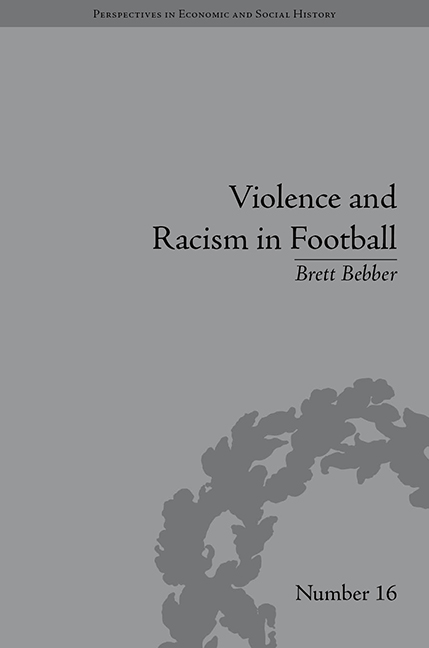Book contents
- Frontmatter
- CONTENTS
- Acknowledgements
- List of Figures
- Introduction: Sport, Politics and History in Post-War Britain
- Part I Violence and Politics in British Football
- Part II The Total Policy of Containment
- Part III Racism and Cultural Conflict in British Football
- 6 The Football Front: Neo-Fascist and Anti-Fascist Politics in Football, 1977–85
- 7 ‘Ten Years behind the Times’: Racism and Anti-Racism in Football, 1986–98
- 8 ‘A Different Set of Rules’: Black Footballers, Anti-Racism and Whiteness
- Conclusion: Legacies of Violence in British Football
- Notes
- Bibliography
- Index
8 - ‘A Different Set of Rules’: Black Footballers, Anti-Racism and Whiteness
from Part III - Racism and Cultural Conflict in British Football
- Frontmatter
- CONTENTS
- Acknowledgements
- List of Figures
- Introduction: Sport, Politics and History in Post-War Britain
- Part I Violence and Politics in British Football
- Part II The Total Policy of Containment
- Part III Racism and Cultural Conflict in British Football
- 6 The Football Front: Neo-Fascist and Anti-Fascist Politics in Football, 1977–85
- 7 ‘Ten Years behind the Times’: Racism and Anti-Racism in Football, 1986–98
- 8 ‘A Different Set of Rules’: Black Footballers, Anti-Racism and Whiteness
- Conclusion: Legacies of Violence in British Football
- Notes
- Bibliography
- Index
Summary
While the previous two chapters analysed the conflicts between racists and anti-racists, and neo-fascists and anti-fascists, this chapter pays close attention to the responses of black players in the milieu of violence, racism and football. As black footballers began to appear regularly for clubs in the late 1970s and early 1980s, they primarily struggled with questions of professionalism and respect within a publicly visible labour market that emphasized loyalty, club pride and respectability. In the face of ongoing racial abuse and discrimination, black players were often criticized for ‘acting out’ when responding to taunts or ill-treatment. As representatives of clubs, and more broadly of British football, black players consistently came under pressure to defer to the best interests of the sport and to damper their personal emotions. As anti-racist organizations began to recruit and campaign with black footballers, however, these men came under the concomitant pressures of allegiance and resistance. When faced with situations or questions involving racial abuse, black players endeavoured to maintain proper professional conduct, but were also often asked to express tempered derision towards racial abuse. More visceral, aggressive responses by these men to racial abuse had no place. Instead, black players often responded to racial abuse with cleverness, humour and undermining rejoinders that defused the volatility of specific situations without surrendering their reliability as representatives of the national sport.
- Type
- Chapter
- Information
- Violence and Racism in FootballPolitics and Cultural Conflict in British Society, 1968–1998, pp. 205 - 230Publisher: Pickering & ChattoFirst published in: 2014

